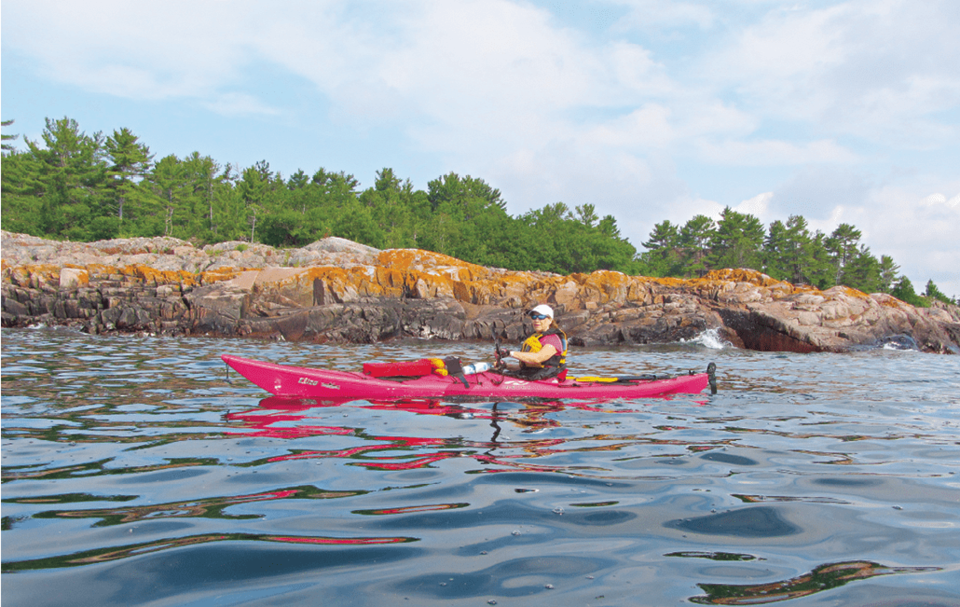BY JOHN SWART VOICE Correspondent
The best thing about the torrential rain that drenched us mercilessly before we set up the tent was that it drowned the mosquitoes.
Guessing that peaty soil and moss can hold 14 times their weight in water, we parked the four-wheel-drive truck where the tent was supposed to go, then pitched our tent on the gravel driveway of the marina. Tomorrow we’d begin our five- day, self-supported kayak trip down the French River and across Georgian Bay to the glacier-scoured granite of the Bustard Islands.
 Self-supported means that every single thing needed for five days goes into or on top of a little yellow fiberglass or plastic sliver of a boat that floats 30 centimeters above the water before you start loading it. Add tent, sleeping bag, chair, food, stove, dishes, clothing for every possible weather, toiletries, water purifier, air mattress, sandals, tetra-packed wine, camp fuel, utensils, spare paddle, ground sheets, more food, and self-rescue equipment (as if the kayak would ever come back to the surface if it flipped with all this stuff in it!), and it’s easy to understand our amazement as one paddler strapped a beer cooler onto his kayak too.
Self-supported means that every single thing needed for five days goes into or on top of a little yellow fiberglass or plastic sliver of a boat that floats 30 centimeters above the water before you start loading it. Add tent, sleeping bag, chair, food, stove, dishes, clothing for every possible weather, toiletries, water purifier, air mattress, sandals, tetra-packed wine, camp fuel, utensils, spare paddle, ground sheets, more food, and self-rescue equipment (as if the kayak would ever come back to the surface if it flipped with all this stuff in it!), and it’s easy to understand our amazement as one paddler strapped a beer cooler onto his kayak too.
A month before the trip, I’d told a fellow paddler I was practicing wet exits. A wet exit is what you do as bloody quick as you can when you’re hanging upside down in the water under your overturned kayak. She suggested I’d be smarter to practice packing. Sure enough, there was no way all the stuff that fit neatly into the boat in my garage would go into it on the dock, entertaining a dozen snickering, experienced kayak campers.
This wasn’t a guided tour, but a group of friends following dated topographical maps; great for hiking elevations, not so good for waterway navigation. Our only portage along the lower French River was a 280-meter planked walkway around a waterfall. The Friends of the French had provided a rickety cart fashioned from a bedspring, one tire split open so it rolled on its tube duct-taped in place, providing just enough stability to precariously portage each kayak.
As we paddled from the waterfall, through narrow rock channels to the open water of Georgian Bay, thunder bellowed menacingly as black skies rolled in, wind whipping the waves to almost a meter in height . We crossed the two kilometre channel to the Bustards in defiance of Mother Nature, and she responded by drenching us with buckets of sweet, warm rainwater.
Next morning, shortly after daybreak, the fishing fanatic of our group was returning to camp with two fishing poles mounted on his kayak, reminiscent of Florida’s deep-sea Marlin boats. His electronic fish finder had sighted numerous fish, but none would take his lures, unwilling to become the main ingredient in the fish pancakes he ate every morning. Later in the trip, a huge smallmouth bass he was attempting to land jumped unexpectedly from his ungloved hand. We knew he was a tough dude as we watched him extract two barbed hooks left impaled in the skin between his thumb and forefinger by the escaping bass.
 Although most pitched their tents on rocky outcrops, my wife and I chose the soft center of a blueberry patch. Two days later, as we silently watched a mother black bear lead her cubs along rocky crags less than a kilometer from our campsite, we rethought sleeping on their dinner plate.
Although most pitched their tents on rocky outcrops, my wife and I chose the soft center of a blueberry patch. Two days later, as we silently watched a mother black bear lead her cubs along rocky crags less than a kilometer from our campsite, we rethought sleeping on their dinner plate.
Paddling in water so clear it needed only filtering to be potable, through the oldest rocks on the planet, we shook our heads in amazement. Micro climates were everywhere; the daintiest flowers clinging to fissures in rock a meter from breaking waves, while completely different species blossomed 50 meters onshore in fertile soil.
Bears watched us paddle, mink competed with water snakes for tasty crayfish, and turtles ignored our approach as they jostled for sunlight on deadheads. Marine weather fronts, confused but unchecked by our flat island, gave us crackling lightning to the west and simultaneously blazing sun and cerulean skies to the east. Moonlight glistened on the waves, making a flashlight at midnight redundant.
The five days passed quickly, and our complaints were replaced with wonderment for this spectacular stretch of northern Georgian Bay. ♦



